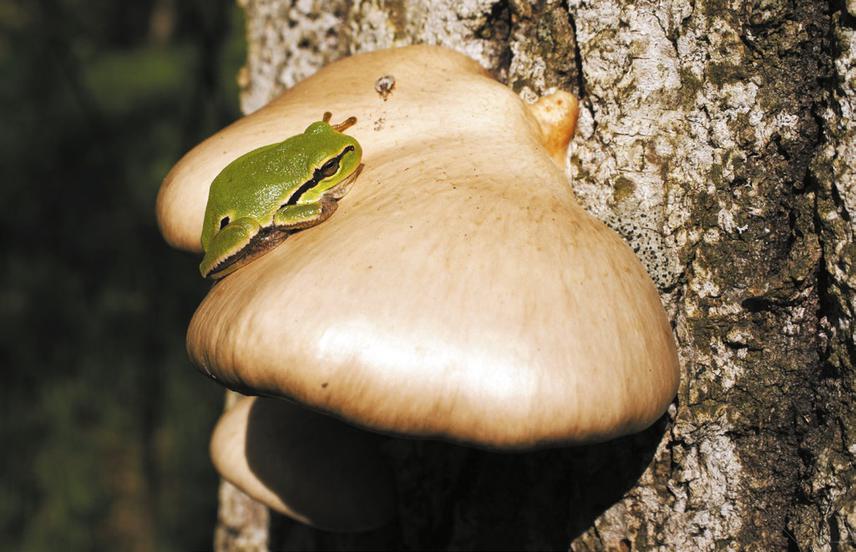Iryna I. Yatsiuk
Our project is focused on Pleurotus calyptratus – fungus rare in Europe and not properly evaluated in Ukraine, and its habitat – aspen groves. We aim to find out its ecological strategy and ratify its conservational status in Ukraine, contribute to conservation of old-growth aspen groves. Our project will also involve raising public awareness about the importance of deadwood in the forest.

Pleurotus calyptratus and Hyla arborea on aspen tree. © Iryna Yatsiuk.
Pleurotus calyptratus is considered rare in Europe. Reasons of its rarity are still unknown. It has no current conservational status in Ukraine and its biology is studied insufficiently. We aim to study its ecological strategy, which would help to estimate the danger of extinction and to evaluate its status.
P.calyptratus fruits on dead aspen wood, but the question is: does it develop in already dead/dying wood or mycelium inhabits living trees? We will clarify it and propose this species to the next edition of the Red Book of Ukraine. If this species inhabits only dead wood, than in future it is expected to become rare in our region, because aspen stands of coeval trees, formed after the clear cuts in the middle 20-th century, now are naturally falling out and replaced by other tree stands. The amount of its substrates tends to decrease. In this case the best way to conserve P.calyptratus is to save old-growth aspen stands and maintain the high level of aspen deadwood. If it is an endophyte (develops in living trees), our effort should be focused mainly on conservation of natural, unnecessarily old, aspen groves. We are going to develop a conservational strategy for this species.
Aspen forests are seriously underestimated from the conservational point of view. Their management provokes serious discussions between National Parks and Forest Agency. According to forest regulations, they have to be clear cut, even in National Parks and other protected areas. Also, deadwood is often thought only as a waste and a source of pests. We aim to change this situation and substantiate the need to conserve aspen stands. Red Data Book status is a valuable reason for authorities to conserve certain areas, and (as P.calyptratus is easily recognizable in the field) it will be a good argument to save aspen groves. We will formulate and submit to Ukraine Forest Agency recommendations for sustainable forest management of aspen stands as endangered habitats of P. calyptratus.
Printed materials will be designed and spread for the aims of environmental education. Booklets and posters will elaborate on the importance of biological conservation and proper forest management. Booklets and posters will be distributed to three National Parks in Kharkiv region and to volunteers and other people via collaboration with NGO’s and other organizations.